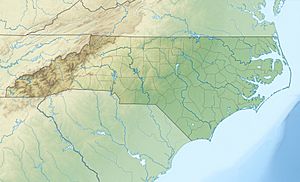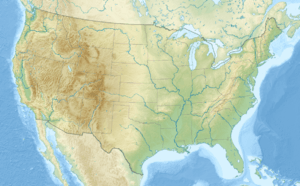Camp Branch (Rocky River tributary) facts for kids
Quick facts for kids Camp Branch |
|
|---|---|
|
Location of Camp Branch mouth
|
|
| Other name(s) | Tributary to Rocky River |
| Country | United States |
| State | North Carolina |
| County | Anson |
| Physical characteristics | |
| Main source | divide between Camp Branch and Bowsaw Branch about 0.5 miles northwest of Cedar Hill, North Carolina 335 ft (102 m) 35°09′10″N 080°05′13″W / 35.15278°N 80.08694°W |
| River mouth | Rocky River about 1.5 miles north of Cedar Hill, North Carolina 197 ft (60 m) 35°09′27″N 080°05′13″W / 35.15750°N 80.08694°W |
| Length | 2.65 mi (4.26 km) |
| Basin features | |
| Progression | generally east |
| River system | Pee Dee |
| Basin size | 2.75 square miles (7.1 km2) |
| Tributaries |
|
| Bridges | Old US 52, US 52, Carpenter Road |
Camp Branch is a small stream located in Anson County, North Carolina. It is about 2.65 miles (4.26 km) long. This stream is like a smaller helper that flows into a bigger river called the Rocky River. Camp Branch is an important part of the local water system, helping to carry water across the land.
The Journey of Camp Branch
Camp Branch begins its journey in Anson County, North Carolina. It starts near a place called Cedar Hill. Here, the land creates a natural divide, sending water towards Camp Branch or another stream, Bowsaw Branch.
From its start, Camp Branch flows generally towards the east. After a short trip, it joins the larger Rocky River. This meeting point is also close to Cedar Hill. The elevation of the stream drops from 335 feet (102 meters) at its source to 197 feet (60 meters) where it meets the Rocky River.
The Camp Branch Watershed
A watershed is like a big natural bowl. All the rain and snow that falls inside this bowl eventually flows into one stream, river, or lake. The Camp Branch watershed covers an area of about 2.75 square miles (7.12 square kilometers).
This area gets a good amount of rain each year, about 47.8 inches (121 cm). Nearly half of the land in the Camp Branch watershed, about 48%, is covered by forests. These forests help keep the water clean and healthy. They also provide homes for many plants and animals.
 | William M. Jackson |
 | Juan E. Gilbert |
 | Neil deGrasse Tyson |



